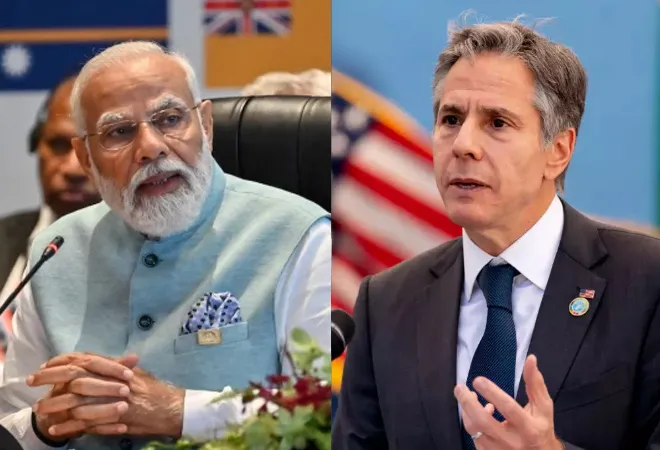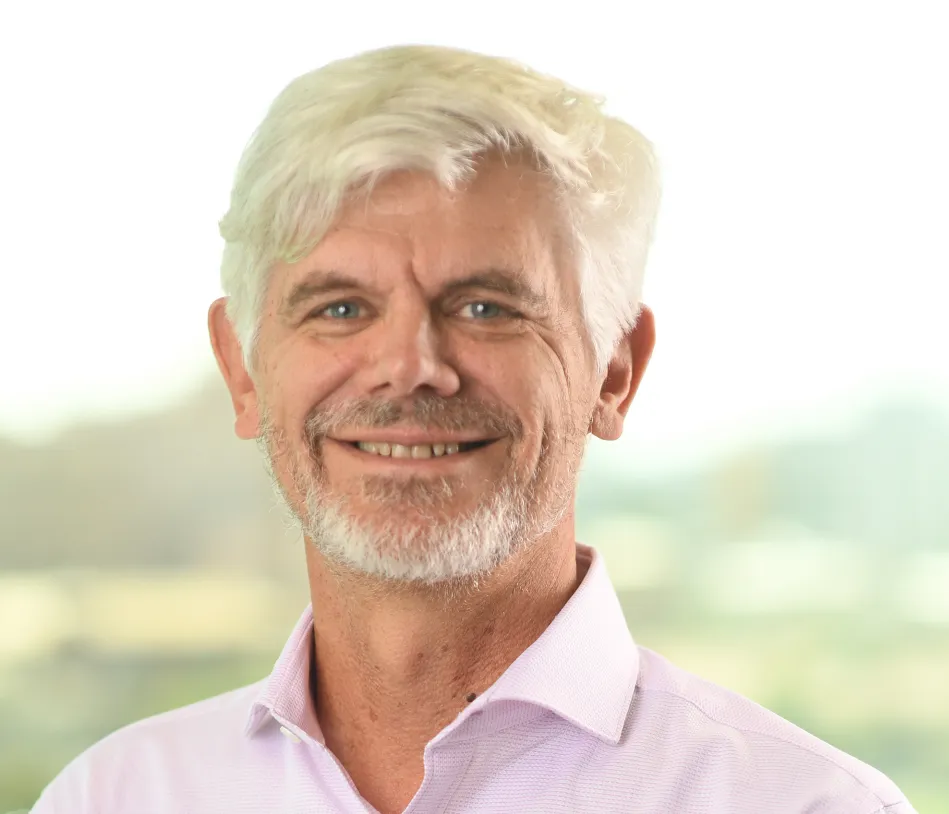-
CENTRES
Progammes & Centres
Location
PM Modi and US Secretary of State Anthony Blinken’s visits to PNG reflect the increasing importance of the Pacific Island countries in the strategic calculations of the democratic powers

Papua New Guinea (PNG) has been in the international spotlight over the last week, and the highlight for the people of that country has undoubtedly been the visit of Prime Minister Narendra Modi, who received a hugely enthusiastic welcome on Monday, 22 May, when he arrived to conduct the first visit to the country by an Indian head of government.
The images of PNG Prime Minister James Marape joyfully stooping to touch Modi’s feet sent a clear and deliberate message of personal respect for his visitor, whom Marape described, “the leader of the Global South”. In his formal comments, Marape enjoined him “to offer a third big voice in the face of the global north”.
The warmth of the welcome pointed to the special “value-add” that India, as a former colony and developing country, offers the region and its democratic partners as they work to demonstrate the value of engaging with them rather than an increasingly assertive China. The Modi visit provided the clearest signal yet of India’s intention to support these efforts, and its willingness to extend its strategic outreach beyond the Indian Ocean and Southeast Asian regions—an inclination first shown when Modi hosted the first summit in Fiji in 2014.
With what the Pacific sees as its inspirational development narrative, its major power status and cultural links to the region, India could play a very important role in the region if it follows up with substantive collaboration with regional countries on climate change, security, and sustainable development.
With what the Pacific sees as its inspirational development narrative, its major power status and cultural links to the region, India could play a very important role in the region if it follows up with substantive collaboration with regional countries on climate change, security, and sustainable development. And Modi certainly indicated that this was his intention at the third summit of the Forum for India-Pacific Islands Cooperation (FIPIC III), which he convened during the PNG visit.
Fourteen leaders of the Pacific Island Forum (PIF) countries and territories attended the summit, where Modi told them that India was proud to be their development partner and was committed to a “free, open and inclusive” Indo Pacific. He spoke of specific Indian development projects such as a convention Centre in Palau, waste management programmes in Nauru, agricultural programmes in Fiji, and solar lights in Kiribati. He also highlighted the Sustainable Coastal and Ocean Research Institute at the University of the South Pacific in Fiji, which aims to leverage India's experiences in sustainable development for collaboration with Pacific Island countries. Modi expressed India’s willingness to offer further support in areas such as digital and space technology, health and food security, climate change, and environmental conservation.
India’s decision not to invite certain PIF members to the formal summit—namely Australia, New Zealand and the French Pacific territories—has led some to question what this says about India’s commitment to working with regional institutions. But the New Zealand Prime Minister and Senator Conroy of Australia—in the country to participate in the parallel US-convened summit (below)—were invited to the lunch session with the group, and their non-inclusion in the full meeting might actually have been tactically useful on this occasion from everyone’s perspective. If the region’s “traditional” partners are keen to encourage India to step forward into a substantive and positive regional role, then it probably helps that the symbolism of the India-Pacific meeting was not diluted by the sound of them detailing their own familiar cooperative efforts with the region.
If the region’s “traditional” partners are keen to encourage India to step forward into a substantive and positive regional role, then it probably helps that the symbolism of the India-Pacific meeting was not diluted by the sound of them detailing their own familiar cooperative efforts with the region.
PNG and Fiji both took the opportunity of Modi’s presence to confer on him their nations’ highest civilian honours. The Governor-General awarded him the Grand Companion of the Order of Logohu, whose recipients are entitled "Chief", and visiting Fiji prime minister Sitiveni Rambuka bestowed on his Indian counterpart the Companion of the Order of Fiji.
Modi’s visit overlapped with that of United States (US) Secretary of State, Anthony Blinken, who was standing in for President Biden whose much-anticipated stopover in the country was cancelled, along with his planned subsequent visit to Australia, because of the crisis in the US Congress over the federal debt ceiling. Blinken and PNG counterparts signed an updated Defence Cooperation Agreement and an Agreement Concerning Counter Illicit Transnational Maritime Activity Operations.
For Marape, the Modi visit must have offered the perfect political balance to the signing of these US agreements, which prompted some student demonstrations about their perceived lack of transparency, and concerns that they compromised the country’s independence by bringing it more firmly into the US sphere of control. Some opposition political figures also spoke of the risk of angering China and, thus, inviting potentially harmful repercussions for PNG’s economic security. Marape and his government stood their ground, with the prime minister arguing that the agreement had “nothing to do with China", and that PNG’s sovereignty remained intact. He also pointed to his government’s “healthy” relationship with Beijing and China’s status as an important trading partner for PNG.
While Chinese investment and development support for PNG actually remains very limited compared to that of Australia—PNG’s largest partner in economic, development, and security terms—it looms large as a trading partner and Chinese state-owned enterprises are now heavily engaged in PNG, particularly its construction sector.
The updated US-PNG defence relationship, combined with a now-established pattern of senior US-Pacific political dialogue, recent growth in regional US development support, and the upgrading of its regional diplomatic network, provides some corroboration that a long-promised American recommitment to the Pacific is finally underway. Biden’s planned visit would have sealed this message symbolically—it would have been the first ever to a Pacific Island country—and its cancellation was undoubtedly a setback.
These two overlapping visits were major steps in a broader, substantial uptick in PNG’s external engagement: British Foreign Secretary James Cleverly also visited the country in April, signing a defence framework agreement, and Indonesian President Jokowi will be there in June. France has also recently signed a status of forces agreement with PNG, and Australia is negotiating a security treaty that is expected to substantially upgrade its longstanding defence cooperation agreement.
All this activity reflects the increasing importance of the Pacific Island countries in the strategic calculations of the democratic powers amidst growing Chinese influence and heightened US-China tensions in the region.
All this activity reflects the increasing importance of the Pacific Island countries in the strategic calculations of the democratic powers amidst growing Chinese influence and heightened US-China tensions in the region. This is particularly true of PNG—the largest nation in the region by far—located only a few kilometres from Australia near the intersection point between Asia and the Pacific. It is also clear that Australia’s partners have come to understand that they cannot leave it to Australia alone to carry the democratic standard in the Pacific.
PNG will remain committed to its “friends to all, enemies to none” foreign policy approach. In recent years, its leaders have joined others from the Pacific in expressing impatience with the strategic rivalry between their external partners and alarm at signs of greater militarisation in the region. India’s independent stance on global issues will be seen by many in the region as a model.
Ian Kemish is Expert Associate with the ANU National Security College and an Adjunct Professor with the University of Queensland
The views expressed above belong to the author(s). ORF research and analyses now available on Telegram! Click here to access our curated content — blogs, longforms and interviews.

Ian Kemish is a former Australian ambassador. He is Expert Associate with the ANU National Security College and an Adjunct Professor with the University of ...
Read More +